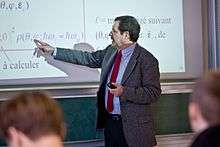Alain Aspect
Alain Aspect (French: [aspɛ] (![]()
Alain Aspect | |
|---|---|
 Aspect in 2015, portrait via the Royal Society | |
| Born | 15 June 1947 Agen, France |
| Alma mater | École Normale Supérieure de Cachan (E.N.S., 1965) |
| Known for | Bell test experiments |
| Awards |
|
| Scientific career | |
| Fields | Physicist |
| Institutions | Institut d'Optique École Polytechnique Centre national de la recherche scientifique |
| Website | www |
Education
Aspect is a graduate of the École Normale Supérieure de Cachan (ENS Cachan). He passed the 'agrégation' in physics in 1969 and received his master's degree from Université d'Orsay. He then did his national service, teaching for three years in Cameroon.
In the early 1980s, while working on his PhD thesis[5] from the academic rank of lecturer, he performed the Bell test experiments that showed that Albert Einstein, Boris Podolsky and Nathan Rosen's reductio ad absurdum of quantum mechanics, namely that it implied 'ghostly action at a distance', did in fact appear to be realised when two particles were separated by an arbitrarily large distance (see EPR paradox). A correlation between their wave functions remained, as they were once part of the same wave-function that was not disturbed before one of the child particles was measured.
Aspect also received an honorary doctorate from Heriot-Watt University in 2008.[6]
Research
Aspect's experiments, following the first experiment of Stuart Freedman and John Clauser in 1972, were considered to provide further support to the thesis that Bell's inequalities are violated in its CHSH version, in particular by closing a form of the locality loophole. However, his results were not completely conclusive since there were loopholes that allowed for alternative explanations that comply with local realism.[7]
After his works on Bell's inequalities, Aspect turned toward studies of laser cooling of neutral atoms and is mostly involved in Bose–Einstein condensates related experiments.

Aspect was deputy director of the French "grande école" SupOptique until 1994. He is a member of the French Academy of Sciences and French Academy of Technologies, and professor at the École Polytechnique.

Awards and honors
Aspect was elected a Foreign Member of the Royal Society (ForMemRS) in 2015.[8] His certificate of election reads
For his fundamental experiments in quantum optics and atomic physics. Alain Aspect was the first to exclude subluminal communication between the measurement stations in experimental demonstrations that quantum mechanics invalidates separable hidden-variable theories and the first to demonstrate experimentally the wave–particle duality of single photons. He co-invented the technique of velocity-selective coherent population trapping, was the first to compare the Hanbury Brown-Twiss correlations of fermions and bosons under the same conditions, and the first to demonstrate Anderson localization in an ultra-cold atom system. His experiments illuminate fundamental aspects of the quantum-mechanical behaviour of single photons, photon pairs and atoms.[1]
In 2005 he was awarded the gold medal of the Centre national de la recherche scientifique, where he is Research Director. The 2010 Wolf Prize in physics was awarded to Aspect, Anton Zeilinger and John Clauser. In 2013 Aspect was awarded both the Niels Bohr International Gold Medal and the UNESCO Niels Bohr Medal. In 2013 he was also awarded the Balzan Prize for Quantum Information Processing and Communication.
Asteroid 33163 Alainaspect, discovered by astronomers at Caussols in 1998, was named after him.[9] The official naming citation was published by the Minor Planet Center on 8 November 2019 (M.P.C. 118220).[10]
References
- "Certificate of Election: EC/2015/48: Aspect, Alain". London: The Royal Society. Archived from the original on 2015-09-16.
- Experimental Realization of Einstein-Podolsky-Rosen-Bohm Gedankenexperiment: A New Violation of Bell's Inequalities, A. Aspect, P. Grangier, and G. Roger, Physical Review Letters, Vol. 49, Iss. 2, pp. 91–94 (1982) doi:10.1103/PhysRevLett.49.91
- Experimental Test of Bell's Inequalities Using Time-Varying Analyzers, A. Aspect, J. Dalibard and G. Roger, Physical Review Letters, Vol. 49, Iss. 25, pp. 1804–1807 (1982) doi:10.1103/PhysRevLett.49.1804
- Aspect, Alain (2007). "Quantum mechanics: To be or not to be local". Nature. 446 (7138): 866–867. Bibcode:2007Natur.446..866A. doi:10.1038/446866a. ISSN 0028-0836. PMID 17443174.
- "CV". Archived from the original on 2012-03-20. Retrieved 2011-03-05.
- "Annual Review 2008: Principal's Review". www1.hw.ac.uk. Archived from the original on 2016-04-12. Retrieved 2016-03-29.
- Reference missing
- "Alain Aspect | Royal Society".
- "(33163) Alainaspect". Minor Planet Center. Retrieved 20 November 2019.
- "MPC/MPO/MPS Archive". Minor Planet Center. Retrieved 20 November 2019.
Publications
- Lévy statistics and laser cooling : how rare events bring atoms to rest. Cambridge: Cambridge University Press. 2002. ISBN 0511016018. (co-author)
- Bell, J. S. (2004). Speakable and unspeakable in quantum mechanics : collected papers on quantum philosophy (Rev. ed.). Cambridge: Cambridge University Press. ISBN 0521818621. (Introduction)
- Grynberg, Gilbert. (2010). Introduction to quantum optics : from the semi-classical approach to quantized light. Aspect, Alain., Fabre, Claude. Cambridge: Cambridge University Press. ISBN 9780511789724.
External links
| Wikiquote has quotations related to: Alain Aspect |
- Aspect's homepage
- Atom Optics group, Laboratoire Charles Fabry, Institut d'Optique
- Biography at CNRS
- https://web.archive.org/web/20120320235756/http://www.lcf.institutoptique.fr/Groupes-de-recherche/Optique-atomique/Membres/Membres-permanents/Alain-Aspect
- http://www.academie-sciences.fr/academie/membre/Aspect_Alain.htm
- Alain Aspect International Balzan Prize Foundation
- Videos of Alain Aspect in the AV-Portal of the German National Library of Science and Technology